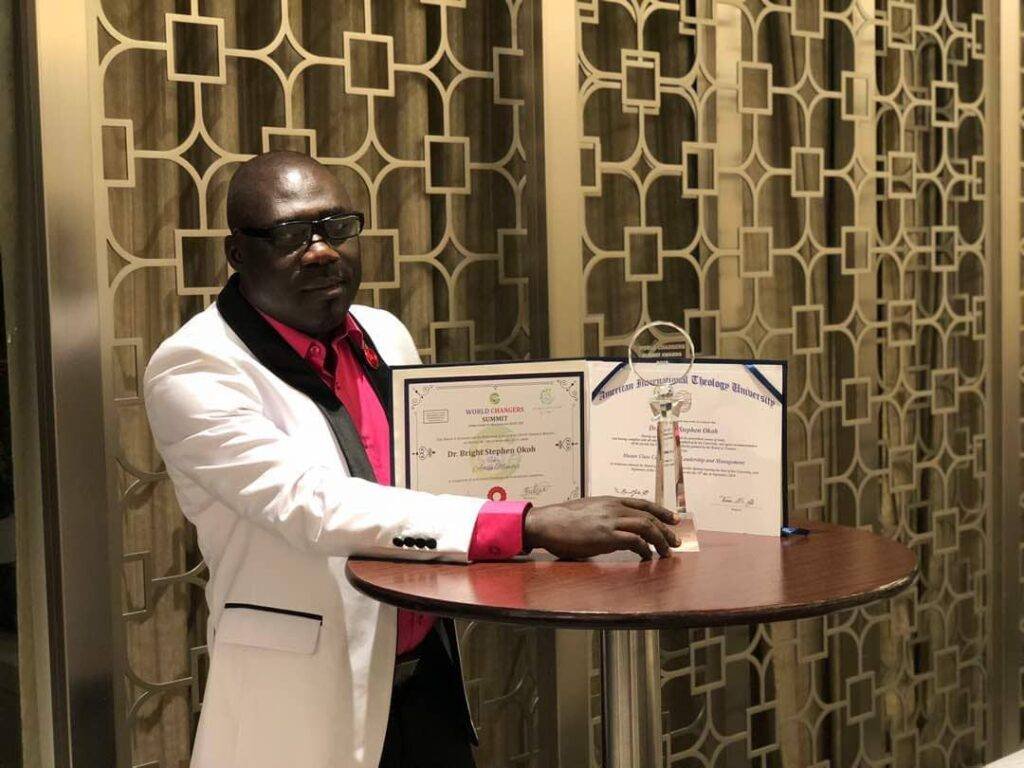Hot!
Delivering quality healthcare with alternative medicine – Dr Bright Okoh shows the way

Dr Bright Okoh
An astute herbal medicine practitioner, Dr Bright Okoh, with over two decades of experience is leading a group of over 30 health professionals to complement quality healthcare delivery in Ghana with alternative medicine.
Operating the Greenfield Scientific Herbal Clinic, a fast-growing health facility and a heavyweight in the alternative medicine industry, Dr Okoh has carved a niche as one of the best on the continent and the world at large.
Dr Okoh started the Greenfield journey in 2009 as a herbal shop in Nungua and later expanded to a herbal centre about five years later. Today, the shop has become an ultra-modern herbal clinic with facilities to offer various services.
With over a decade of practice and saving lives with alternative medicine, Dr Okoh, a degree holder in holistic medicine, has established Greenfield as a fully-fledged health centre in Ghana, serving the medical needs of people within the community and beyond.
Operating at Buade in Nungua, Accra the clinic with expertise in stroke, infertility, halitosis, sexual weakness, hypertension, bone settings, sexually transmitted disease and others, have won several awards including the ultimate Best Herbal Practitioner of the Year, 2020, an award held by Afrik Media in collaboration with the Ministry of Health.
Prior to that, Dr Okoh the Chief Executive Officer was awarded the Bone Setting Specialist of the Year in 2018 at the seventh African Health Legendary Awards. The company won the West African Traditional and Alternative Medicine Awards in 2019, Promising Scientific Herbal Centre of the Year in 2017 and the Best Facility in Herbal Clinic in Greater Accra.
On the global stage, the health centre won the Best Herbal Clinic of the Year at the World Changers Summit and Awards 2018 in Dubai. The clinic further won the outstanding stroke centre and bone settings specialist of the year in 2019 organised by the African Health Legendary Awards.
Dr Okoh believes that the recognition came out of their dedication and commitment to providing quality health care and looks forward to more of such awards next year and beyond.
According to Dr Okoh he has gathered enough experience in the sector and following feedback from clients they would not renege on their efforts to provide quality health care.
He said the World Health Organisation (WHO) recognises alternative or herbal medicine practitioners as they contribute about 60 to 70 per cent of healthcare to people globally.
On Corporate Social Responsibilities activities, they donate to the needy in society including orphanages such as the New Life Orphanage at Nungua. They also give to a disability group in Teshie of which Dr Okoh is a patron. They also present some items to the Kpeshie Police during the COVI9-19 outbreak, conduct regular free health screening exercises at churches, taxi ranks and markets as well as registering over 500 people on the National Health Insurance Scheme (NHIS).
Dr Okoh intends to expand and improve upon quality healthcare in the country.
In addition, he would provide solution to the challenges within the industry bothering around finding raw materials at affordable prizes. Hence, the need to secure lands to cultivate plants for the medical uses as done in other developed countries including the United States of America.
Offering advice on the Christmas festivities Dr Okoh advised the public to eat quality foods with organic products, avoid self-medication and excessive drinking of alcohol, exercise for proper blood circulation and sleep well.
By Michael D. Abayatey
Hot!
Is the “Rev” title biblical?

In many Ghanaian churches, pastors are often introduced as “Reverend” or simply “Rev.”
The title is seen as a mark of respect, yet its biblical basis continues to stir debate.
While some Christians argue that it is a harmless way to honour church leaders, others insist it is unbiblical and should not be used at all.
Those who question the title usually point to the Bible itself. Nowhere in Scripture did Jesus or the apostles use “Reverend” for themselves or for one another.
Instead, they addressed each other as “brother” or “servant.” In Matthew 23, Jesus even warned his followers not to seek titles such as “rabbi” or “father,” teaching that all believers are equal under one God.
Critics also note that Psalm 111:9 describes God’s name alone as “holy and reverend” in the King James Bible.
To them, this means the word should be reserved for God, not for human beings. Others go further, citing Job 32, which cautions against giving flattering titles to men.
For such voices, the modern use of “Reverend” risks elevating pastors beyond what the Bible prescribes.
On the other hand, defenders of the title argue that it is not meant to replace God’s reverence but simply to acknowledge a minister’s role.
In many churches, “Reverend” is given to ordained ministers who have undergone training, much like the way a doctor is addressed as “Dr.”
The Bible itself, they point out, encourages believers to honour their leaders, with 1 Timothy 5:17 stating that elders who direct the affairs of the church well are “worthy of double honour.”
In this sense, the title is seen as a formal courtesy rather than a theological statement.
Supporters remind critics that Christianity does not operate in a vacuum but within cultural settings.
In Ghanaian society, respect for elders and authority is central to social order. Just as chiefs are addressed with titles such as “Nana” or “Togbe,” many Christians believe it is fitting to extend a similar courtesy to church leaders.
In their view, calling a pastor “Reverend” reflects Ghanaian values of honour and respect, and does not amount to worshipping a human being.
Yet the debate is far from settled. Some argue that the title has been abused, with individuals presenting themselves as “Reverend” without any proper training or accountability.
Calls have even been made for the regulation of church titles to prevent confusion and protect the credibility of ministry. Others, however, see no harm in its continued use, so long as it is not taken beyond what Scripture allows.
At the heart of the matter lies a bigger question: should Christians stick strictly to biblical language when addressing their leaders, or is it acceptable to adapt titles as society evolves?
The conversation is not just theological but cultural, touching on how Ghana balances respect for tradition with the authority of Scripture.
The debate over the “Rev” title is therefore not one with easy answers. What is clear, however, is that it forces us to reflect on how we show honour, how we interpret the Bible, and how faith interacts with our cultural practices.
As the discussion continues in church pews and on social platforms, we ask you: should pastors and ministers be called “Reverend,” or should Christians abandon the title altogether?
By: Jacob Aggrey
Hot!
Police confirm arrest of two suspects in Asankrangwa murder case

The Western Central Regional Police Command has confirmed the arrest of two men in connection with the fatal stabbing of a 20-year-old man at the Asankrangwa Education Area on Sunday, August 17, 2025.
In a statement signed by the Head of the Public Affairs Unit, ASP Beatrice Turkson, the police said preliminary investigations revealed that the deceased was chased and stabbed multiple times by a group of people.
The incident is believed to have stemmed from a misunderstanding between the deceased and one of the suspects, identified as 36-year-old Kwasi Opong.
According to the police, swift action led to the arrest of Opong and another suspect, 23-year-old William Francis Osei. Both are currently in custody assisting with investigations, while efforts are underway to apprehend another suspect who is still on the run.
The police noted that the body of the deceased has been deposited at the Asankrangwa Catholic Hospital morgue for preservation and autopsy.
“The Command assures the public that all persons connected to this heinous crime will be brought to justice,” the statement said.
The police appealed to the public to provide any information that could assist in the ongoing investigations.
By: Jacob Aggrey






